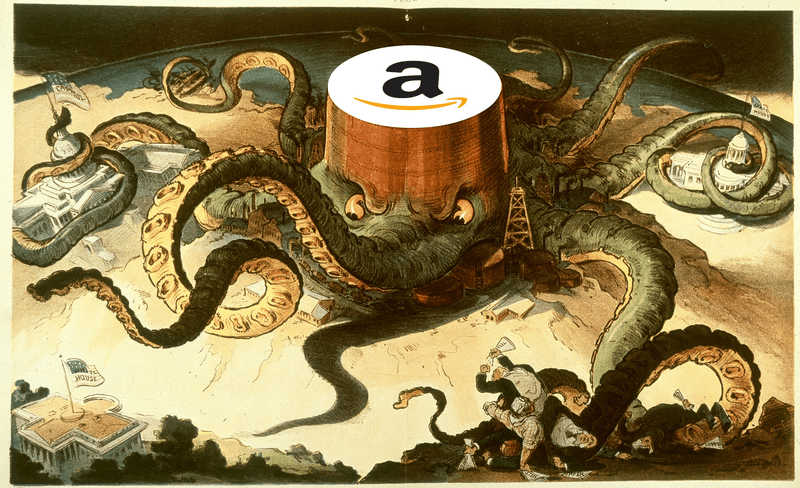The “Everything Store”: Amazon and monopolies

Amazon Antitrust by On the Media. Cartoon from the Library of Congress.
Ben Johnson -Early last week, the Federal Trade Commission (FTC), along with 17 states, sued Amazon over accusations of protecting a monopoly. Founded in 1994, the online shopping platform has grown into one of the largest companies in the world, with a revenue of USD 524.9 billion as of this year. The lawsuit adds to a growing list of tech companies facing scrutiny over antitrust laws and raises the question of whether these regulations need to be updated.
Amazon’s staggering success is largely because of its ever-expanding network of merchants, subsidiary companies, and consumers. In the most basic terms, networks are a collection of linked nodes. While nodes often perform different tasks and operate independently, they contribute to an overall goal or purpose. Amazon acts as the link between nodes such as producers, buyers, and sellers. Indeed, the company has increasingly taken the role of producer as it begins to manufacture its own goods. According to the FTC, Amazon's sheer size and reach have allowed it to “seize control over much of the online retail economy.” The federal government’s report includes accusations of the company making it difficult for vendors to sell and advertise their products on sites other than Amazon. Additionally, the report found that Amazon favored its products while using less favored advertising for other merchants. Tech companies like Google and Meta face similar lawsuits, illustrating the growing criticism of current antitrust laws. These laws were created to stop unfair regulation of trade, including monopolies. Critics argue they are outdated and inadequate in the face of companies as massive as Amazon. Each of these companies represents vast economic and communication networks. The lawsuits they are facing reveal just how interconnected the globe is and the power these companies wield.
Scale is a critical factor in these lawsuits and their ensuing consequences. A hierarchy that ranges from the individual to the international, scale is how we describe the geographical extent of an action. In this case, Amazon operates on a global scale, thus affecting each level down to the individual. For example, if the lawsuit results in greater restrictions on the company, a likely consequence is a more competitive market for sellers. Depending on what is being sold, this change could affect not only the individual level but the local as well. Conversely, Amazon argues that increased restrictions will instead limit the success of small businesses and individuals. Whatever the verdict, scales and networks will feel the ripples.
Source: Amazon Antitrust by On the Media. Cartoon from the Library of Congress The Great Economic Super Bowl by Matt Wuerker, CC BY-SA 4.0, via Wikimedia Commons

